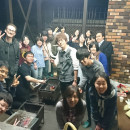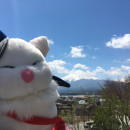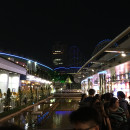How I wish I started University in Japan Past Review
By A student (Becker College) - abroad from 03/27/2017 to 07/30/2017 with
CIEE: Tokyo - Arts and Sciences
I have expressed many positive thoughts about studying abroad. As of this review, I have graduated from my home university and decided to enroll in one more semester abroad outside of my home university and host program. Therefore, yes, my experience studying abroad is more than worthwhile--it is a memory I will carry with me throughout my life.
Review Photos




Personal Information
| How much international exposure did you have prior to this program? | 0-2 weeks |
Review Your Program
|
* Overall educational experience
Academic rigor, intensity, resources, etc. |
Studying at Sophia University, the academic workload is the same as any college or university. Depending on the course you enroll in, extra curricular activities you partake in, and your personal plans, your educational experience will vary. |
|
* Host Country Program Administration
On-site administration of your program |
The CIEE staff is great in assisting their >>enrolled<< students with any problems they need. The staff goes above and beyond to ensure that students have a great experience while studying in Japan. |
|
* Housing:
How satisfied were you with your living arrangements? |
At first my living arrangements extraordinary. I chose the homestay option and it was a great experience living with a Japanese family and having the experience of living in Japan. My only problem is that somewhere along the lines, my host-father wanted me to go out and travel to cities outside of Tokyo without thinking of my preferences. I am not particular about sightseeing by myself, but with friends, I would gladly do so. However, he kept enforcing the idea that I >>must<< travel by myself especially while school is still in session. My schedule was also very busy because I was working part-time and joined two club circles at Sophia University; this information, the entire family knew because I informed them of my schedule on a bi-/tri-daily basis. Commute to and from school was about a 2 hour 30 minute roundtrip; I did not mind but most people would. |
| * Food: |
Japan takes customer satisfaction above and beyond. |
|
* Social & Cultural Integration:
How integrated did you feel with the local culture? |
Due some forms of media that show daily life in Japan or a large city such as Tokyo, I had an idea how local culture should be. I personally did not experience any culture shock upon my arrival to Japan, but this will vary for each individual. |
|
* Health Care:
How well were health issues addressed during the program? |
I personally did not have any health issues that required attention. Most of the time, you can visit a drug store (kusuri-ya), or pharmacy (yakkyoku) to get everyday medicine. However, one of my friends I met through CIEE, joined an aikido (grappling martial arts) club, and got into an accident. I do not remember all the details but she had dislocated a bone around her knee. CIEE and the iNEXT insurance were not prepared for this. |
| * Safety: |
Japan is one of, if not the most safest city in the world. With the world being under threat of terroristic attacks or news of burglary, I cannot express how safe Japan is without saying this: "Children as young as five years old, walk to and from school without the supervision of parents. Even in congregated areas such as trains, you will see elementary school students unattended." |
| If you could do it all over again would you choose the same program? |
Yes
The answer is yes and no. I would love to enroll with CIEE to study abroad again. However, after my experience, I wish I could have started my college/university life in Japan as a freshman. |
Finances
|
* Money: How easily were you able to live on a student's budget?
(1 = not very easy/$200+ on food & personal expenses/week, 2.5 = $100/week, 5 = very easily/minimal cost) |
If you choose to do a homestay, breakfast and dinner will be provided to you by the family. Some families will allow you to use their shower products and do the laundry for you. In the situation where you must supply your own hygienic needs, costs per week will add up with lunch, club participate fees (sometimes club equipment), traveling outside of Tokyo, personal spending, etc,. |
| Not including program expenses, about how much money did you spend on food and other expenses each week? | Approximately $300 |
| Do you have any general money-saving tips for future study abroad participants? | The recommended personal funding to have is approximately $4000. I strongly recommend at least $6000 if you a pop culture fan (anime, games, manga, etc,.). Japan has a lot of events revolving these popular culture that you will find cheaper to buy it in Japan, rather than importing. As for general saving while living in Japan, you can find a lot of restaurants that sell a full set meal for 400-800 yen (approx. $4-$8 USD). Convenience Stores sell bento boxed lunches for 300-600 yen (approx ($3-$6). For hygienics and other necessities, look for a DAISO (dollar store). The quality of DAISO products is well made compared our perspective of a "dollar store." |
Language
| * Did your program have a foreign language component? | Yes |
|
How much did the program encourage you to use the language?
0 = No encouragement, 5 = frequent encouragement to use the language |
With CIEE, you are required to enroll into a Japanese Language Course. |
| How would you rate your language skills at the beginning of the program? | Beginner |
| How would you rate your language skills at the end of the program? | Intermediate |
| What was the highest level language course you had completed prior to departure? | I have completed Japanese 2 at Bunkerhill Community College. At Sophia University, I may as well have not taken those classes at all. |
| How many hours per day did you use the language? | |
| Do you have any tips/advice on the best ways to practice the language for future study abroad participants? | The best way to practice the language is to surround yourself in a Japanese environment. Living in Japan will not suffice. I strongly recommend joining a club that has practice meetings such as a sport or entertainment such as breakdancing. You will find yourself having to use Japanese and slowly, you will be able to pick up the language. Break out of your circle of friends. If you come to Japan with little to no Japanese language skills and you know of someone from your home university, you will find yourself sticking together throughout your stay. Do not be afraid to have different plans such as joining different clubs. There is plenty of time to hangout with each other after class or during the weekends or when you go back to your home country. |
Other Program Information
|
* Where did you live?
Select all that apply |
|
|
* Who did you live with?
Select all that apply |
|
|
* Who did you take classes with?
Select all that apply |
|
| About how many local friends did you make that you will likely keep in touch with? | 10+ |
A Look Back
| * What did you like most about the program? |
|
| * What could be improved? |
|
| * What do you know now that you wish you knew before going on this program? | I wish I knew more Japanese so I could further involve myself with the clubs I joined at Sophia University. |
Reasons For Studying Abroad
| To help future students find programs attended by like-minded individuals, please choose the profile that most closely represents you. |
The Outright UrbaniteA social butterfly, you're happiest in bustling cities with hip people, and took advantage of all it had to offer. You enjoyed the nightlife, and had fun going out dancing, and socializing with friends. Fun-loving and dressed to the nines, you enjoyed discovering new restaurants, shops, cafes, and bars in your host country. |
Individual Course Reviews
| Course Name/Rating: |
AJPN111 |
| Course Department: | Japanese for Foreign Students (FLA) |
| Instructor: | Sakata / Tada |
| Instruction Language: | English / Japanese |
| Comments: | This an introduction class to Japanese and covers the language through a series of textbooks called "Situational Functional Japanese." The textbook is slightly similar textbooks used in countries outside of Japan such as "Genki" or "Japanese for Busy People." The flow of the classroom is very intense and rigorous. Enrolling in a Japanese language class in Sophia University, you meet five days a week for 90-minutes per class, or ten days a week if you are in the intensive course. Every teacher in every course level follows the class schedule and syllabus strictly and precisely. Compared to the two Japanese classes I have taken three years ago as of this review, everything I learned was covered in three or four weeks of this introduction course. Tests, quizzes, and exams are very precise; there is absolutely no make-up without a medical note from the hospital or having submit a health-related disability to the department, not the school. Despite having a heavily enforced system, the material is fairly easy and simple as long as you complete the homework, review the material for an hour each day, and participate in the lectures. Overall, this class has given me the ability to live a day-to-day life in Japan. You will learn enough to navigate throughout Tokyo; asking for directions, placing an order, shopping for necessities or clothes, etc,. On a conversation level, you will be able to talk with natives about information you can fill out on an application form; "What is your name?" "Where are you from" "What is your field of study" "What is your hobby?" etc,. |
| Credit Transfer Issues: |








